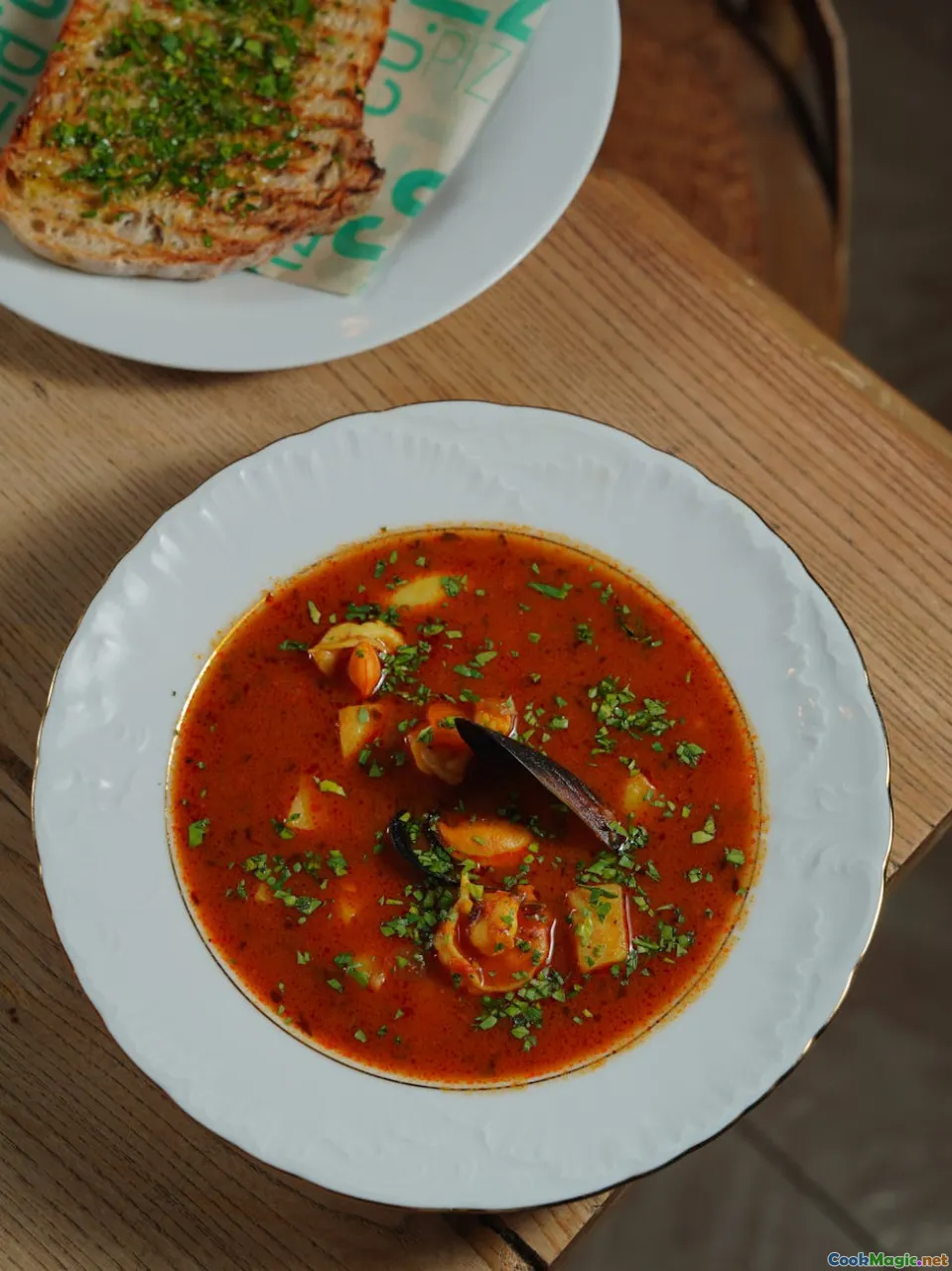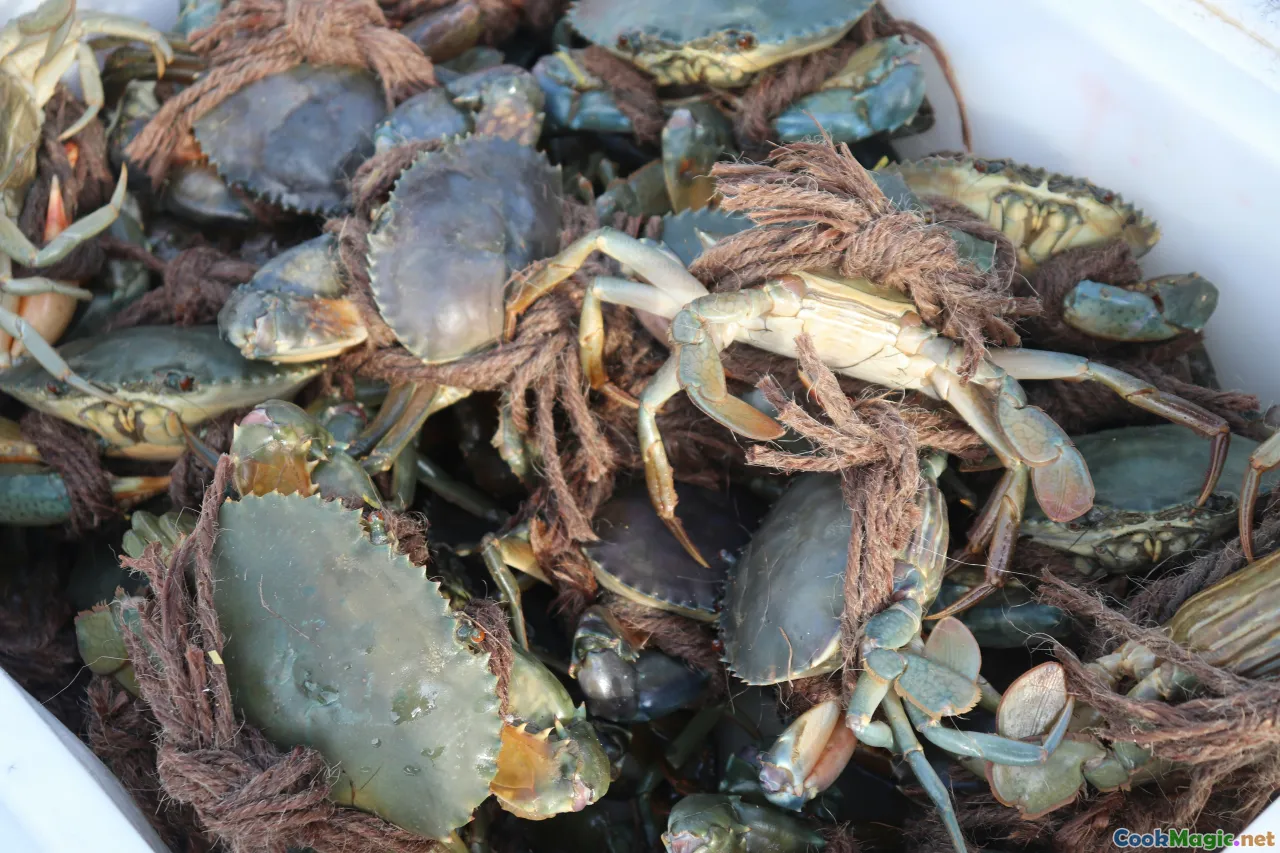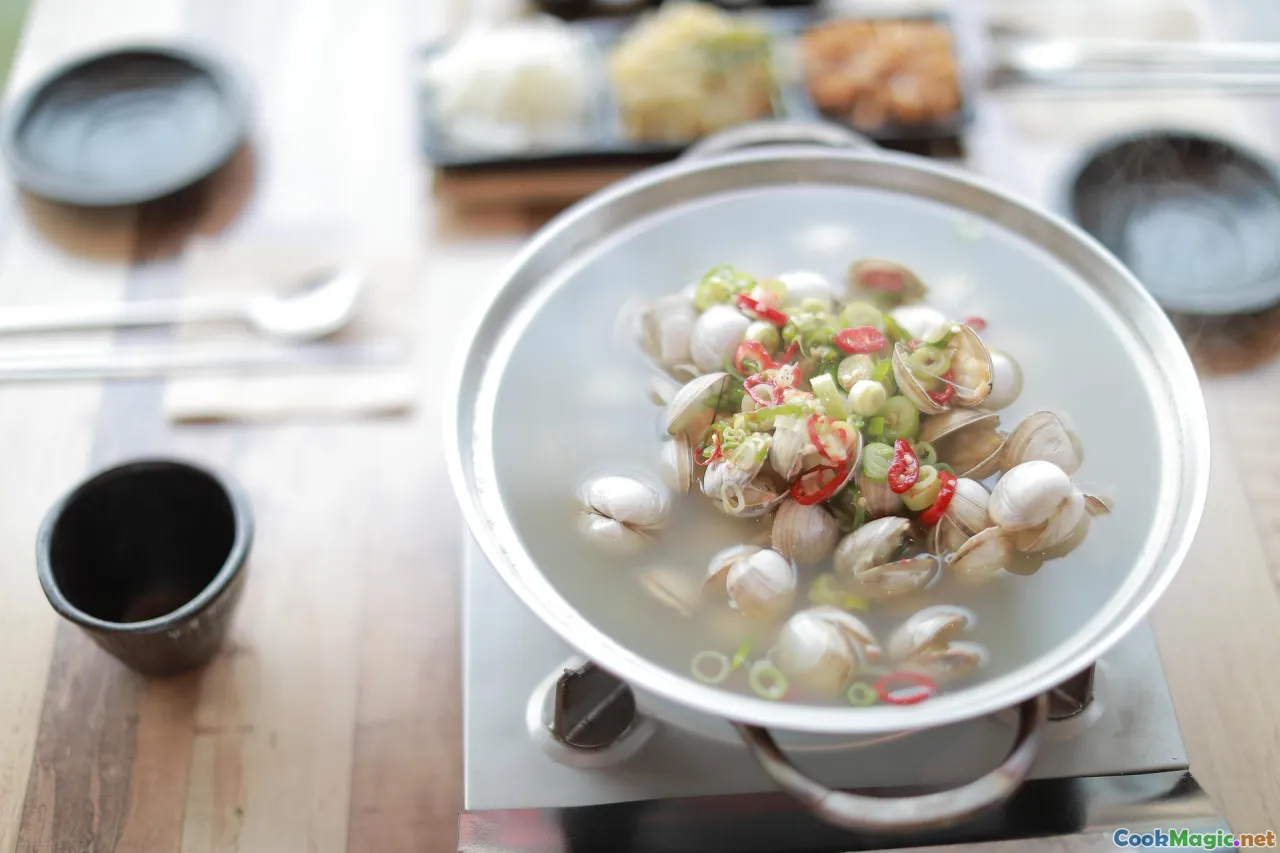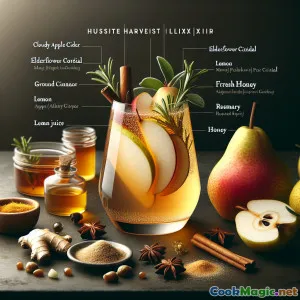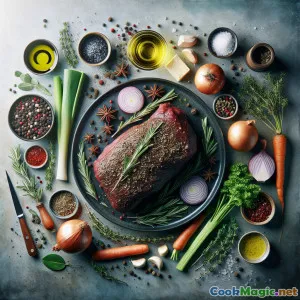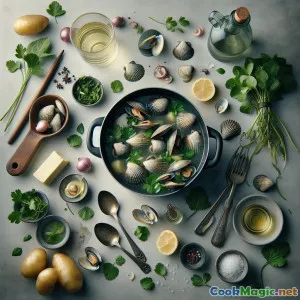
Sopa de Mariscos com Arruda: Uma Twist Costeira Inglesa
(Mugwort Clam Soup: An English Coastal Twist)
(0 Avaliações)0
1,043
julho 18, 2025
Reportar um problema
Ingredientes
-
500 grams Amêijoas frescas
(Limpo meticulosamente; amêijoas littleneck ou amêijoas britânicas nativas.)
-
20 grams Folhas de artemísia frescas
(Apenas folhas jovens e tenras. Lave bem e pique.)
-
2 medium Chalotas
(Picado finamente)
-
100 ml vinho branco seco
(De preferência, vinho branco inglês.)
-
20 grams Manteiga sem sal
(Adiciona riqueza. Pode ser substituído por óleo.)
-
500 ml Água ou caldo de peixe
(Caldo de peixe de boa qualidade é preferível.)
-
1 small (approx. 80g) Batata
(Descascadas, cortadas em cubos. De textura cerosa, como Charlotte recomendou.)
-
1 small handful Salsa fresca
(picado, para finalizar.)
-
1 tsp Sal
(Prove e ajuste com cuidado.)
-
0.5 tsp Pimenta-do-reino moída na hora
(A gosto.)
-
0.5 tsp Raspas de limão
(Ralada fresca; acabamento brilhante opcional.)
(Limpo meticulosamente; amêijoas littleneck ou amêijoas britânicas nativas.)
(Apenas folhas jovens e tenras. Lave bem e pique.)
(Picado finamente)
(De preferência, vinho branco inglês.)
(Adiciona riqueza. Pode ser substituído por óleo.)
(Caldo de peixe de boa qualidade é preferível.)
(Descascadas, cortadas em cubos. De textura cerosa, como Charlotte recomendou.)
(picado, para finalizar.)
(Prove e ajuste com cuidado.)
(A gosto.)
(Ralada fresca; acabamento brilhante opcional.)
Nutrição
- Porções: 2
- Tamanho da Porção: 1 tigela (350ml)
- Calories: 320 kcal
- Carbohydrates: 25 g
- Protein: 21 g
- Fat: 10 g
- Fiber: 3 g
- Sugar: 2 g
- Sodium: 760 mg
- Cholesterol: 32 mg
- Calcium: 135 mg
- Iron: 11.2 mg
Instruções
-
1 - Esfregue e prepare as amêijoas:
Esfregue amêijoas frescas debaixo de água corrente. Descarte as abertas ou danificadas. Deixe de molho em água salgada por 20 minutos, escorra e enxágue para remover a areia.
-
2 - Iniciar o refogado aromático:
Em uma panela, derreta a manteiga em fogo médio. Adicione chalotas picadas e uma pitada de sal. Cozinhe suavemente por 3–4 minutos, até ficarem macias e translúcidas, sem dourar.
-
3 - Adicionar batatas e desglacear:
Adicione batata em cubos (se estiver usando) e mexa por 1 minuto. Despeje o vinho branco, raspe o fundo da panela e deixe o álcool evaporar por 2 minutos.
-
4 - Adicionar caldo e deixar cozinhar em fogo baixo:
Despeje água ou caldo de peixe. Leve a um fervor suave e cozinhe por 6–7 minutos, até que a batata esteja macia o suficiente. Se optar por não usar a batata, cozinhe por 4 minutos.
-
5 - Amêijoas e Artemisia:
Junte as amêijoas limpas e a maior parte da artemísia picada (reserve um pouco para guarnição). Cubra com uma tampa e cozinhe de 3 a 5 minutos, mexendo a panela ocasionalmente, até que todas as amêijoas se abram. Remova e descarte quaisquer amêijoas que não abrirem.
-
6 - Finalizar e Temperar:
Misture a artêmisia reservada, salsa picada, pimenta-do-reino preta, sal a gosto e raspas de limão, se desejar. Prove e ajuste o tempero.
-
7 - Servir:
Despeje a sopa e as amêijoas nas tigelas. Decore com salsa extra e saboreie bem fumegante, idealmente com um bom pão britânico.
Esfregue amêijoas frescas debaixo de água corrente. Descarte as abertas ou danificadas. Deixe de molho em água salgada por 20 minutos, escorra e enxágue para remover a areia.
Em uma panela, derreta a manteiga em fogo médio. Adicione chalotas picadas e uma pitada de sal. Cozinhe suavemente por 3–4 minutos, até ficarem macias e translúcidas, sem dourar.
Adicione batata em cubos (se estiver usando) e mexa por 1 minuto. Despeje o vinho branco, raspe o fundo da panela e deixe o álcool evaporar por 2 minutos.
Despeje água ou caldo de peixe. Leve a um fervor suave e cozinhe por 6–7 minutos, até que a batata esteja macia o suficiente. Se optar por não usar a batata, cozinhe por 4 minutos.
Junte as amêijoas limpas e a maior parte da artemísia picada (reserve um pouco para guarnição). Cubra com uma tampa e cozinhe de 3 a 5 minutos, mexendo a panela ocasionalmente, até que todas as amêijoas se abram. Remova e descarte quaisquer amêijoas que não abrirem.
Misture a artêmisia reservada, salsa picada, pimenta-do-reino preta, sal a gosto e raspas de limão, se desejar. Prove e ajuste o tempero.
Despeje a sopa e as amêijoas nas tigelas. Decore com salsa extra e saboreie bem fumegante, idealmente com um bom pão britânico.
Mais sobre: Sopa de Mariscos com Arruda: Uma Twist Costeira Inglesa
Mugwort Clam Soup: Ancient Greens, Coastal Bounty
Mugwort Clam Soup marries earthy woodland herbs with the bounty of the English coast for a wonderful, unusual dish that bridges tradition and modern English cookery.
History & Cultural Significance
Clam dishes have long featured in British coastal kitchens; native species like palourde or common cockle have provided rich nutrition for centuries. Adding mugwort introduces even deeper heritage: mugwort (Artemisia vulgaris), ubiquitous along hedgerows, fields, and riverbanks in the British Isles, served as both seasoning and medicinal herb for millennia. Historically, mugwort was prized for its digestive, tonic, and slightly bitter notes. Old English and Celtic gastronomy made liberal use of wild greens like mugwort, especially in spring for restorative dishes.
Though mugwort was traditionally added to stuffings and game or brewed in teas, its aromatic profile resonates with shellfish, subtly lending earth, bittersweet, and even anise-like undertones to seafood broths. Mugwort complements the salinity and delicacy of British clams surprisingly well, producing a soup at once ancient and modern.
Unique Aspects & Tips
- Selecting Mugwort: Use only the youngest mugwort leaves for the soup; older leaves may be fibrous. Mugwort is assertive so use sparingly until you appreciate its aromatic punch.
- Clams: Little English clams (like the palourdes of Cornwall or Scottish waters) are sweetest in late spring. Ensure they are spotless—traditional advice includes soaking in salty water to draw out sand.
- Broth: English dry white wine lifts the broth, while any coastal fish stock deepens seafood resonance. Chicken or vegetable stock works in a pinch but avoid overpowering the subtle herbs.
- Variations: Try with cockles or mussels if clams are unavailable. Add a dash of double cream for a nod to classic chowder or toss in wild leeks in early spring for even greater fragrance.
- Pairing: Serve with a hearty soda bread or a slice of nutty malted sourdough. To drink, a crisp English white wine or even non-alcoholic elderflower cordial complements herbal notes.
Final Thoughts
This Mugwort Clam Soup is a tribute to old English countryside foraging and the ever-present influence of the sea. The resultant bowl is fragrant, refreshing, briny, herbal, and slightly bitter—the kind of soup that surprises and satisfies palate and soul alike. Whether as a gentle supper to accompany the first sunny British days of spring or the anchor dish of a sophisticated dinner, this recipe connects you to centuries of herbcraft and seashore cookery. Mugwort is increasingly celebrated by modern British chefs; here, it shines as the signature green, with every bite evocative of brisk coastal walks and nostalgic stews.
Be bold in venturing beyond the familiar as English cuisine continues to revive ancient ingredients. The distinctive union of mugwort and clams proves that some remarkable combinations await in overlooked hedgerows and tidal beds—affirming the curiosity and adaptability at the heart of English food. Happy foraging, and enjoy your unique bowlful of Mugwort Clam Soup!

